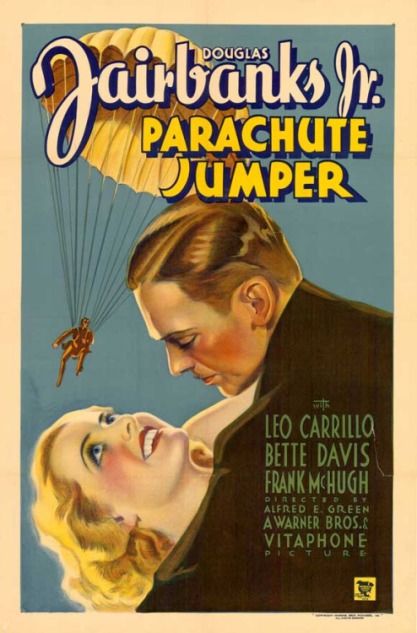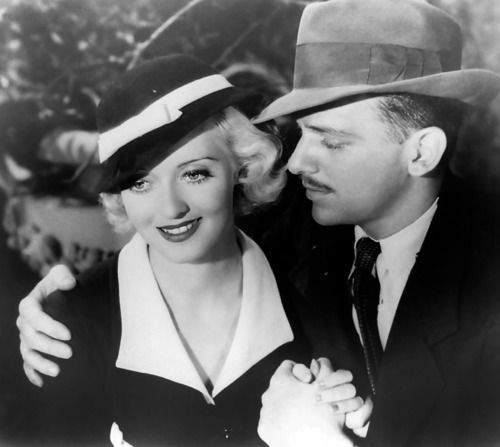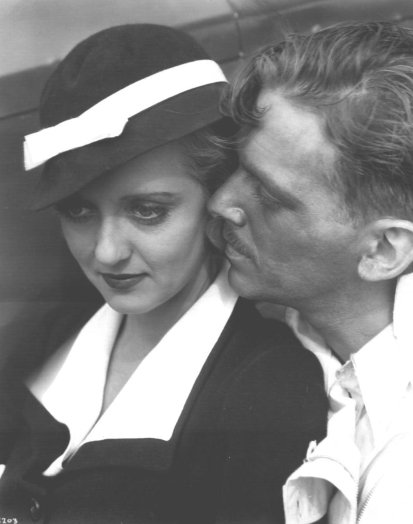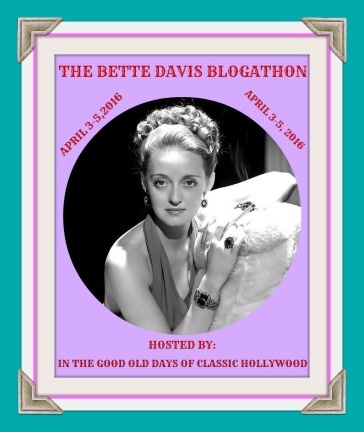The movie Parachute Jumper is known by many Bette Davis admirers to be one of her least favorite films. In fact, she pretty much hated it. So much so, that she used clips from the film in What Ever Happened to Baby Jane? to demonstrate a film career gone wrong. However, Parachute Jumper was not a bad film and even did pretty well in the box office. And it wasn’t just Bette Davis that found this movie to be a drag. Douglas Fairbanks, Jr., her leading man, did not have very fond memories either.

Source: (x)
Parachute Jumper tells the story of two friends, Bill and Toodles, who were recently discharged from the Marines for drinking and canoodling with loose women after their plane crashed in a foreign country. While struggling to make a living, Bill meets Alabama, a southern girl who is dealing with similar struggles. Alabama moves in with Bill and Toodles and begins a romance with Bill. Eventually, Bill gets involved with a gangster named Weber, who he met through Ms. Newberry, a woman he chauffeured for. Things eventually take a turn for the worse and Bill decides he wants out of the nasty business that he has found himself wrapped up in. He agrees to do one last job for Weber which involves he and Toodles carrying illegal drugs over the Canadian border. Bill manages to outwit both Weber and the U.S. Border Patrol and safely crashes the plane. Parachute Jumper has a typical pre-code ending where justice is served and the good guys come out on top. Toodles re-enlists in the Marines and Bill goes on to make the charming Alabama an honest woman by marrying her. (You can watch the trailer below)
So just what was it about this film that made it forgettable to both Davis and Fairbanks?
Based on the research I did, there seems to be a couple of things that made them both unhappy. One of those things was Warner Bros. itself. Bette Davis in particular was fearful of being typecast by Warner as a gangster’s moll. Davis wrote, “I was again a secretary – Daddy had been right – but I was also the mistress of a racketeer. A typist-moll. Warners were vaguely aware, evidently, of a possible niche for me. It took patience on my part.”1 Parachute Jumper was her fourteenth film, and while fourteen sounds like a lot, she was still a rising star and being a newcomer could be dangerous. Several actors at that time were typecast and struggled to break free from roles that fit into that typecast. Davis knew she was better than that and refused to be pigeonholed.
At the same time, Warner Bros. was going through a transitional phase that was the subject of protest among employees. At some point, the studio had hit a financial slump and employees salaries were cut. Darryl Zanuck promised employees that once business improved, salary cuts would be restored. Business did indeed improve and employees were counting on having their cuts restored. Unfortunately, Zanuck left after Jack Warner refused to make good on his promise. Actors such as Douglas Fairbanks, Jr., and James Cagney protested the tasteless, greedy move by Warner. According to Fairbanks, his punishment was having to star in Parachute Jumper. “My first ‘punishment’ was the withdrawal of the fine story I had approved and the substitution of a sub-average story called Parachute Jumper. I decided to be docile. Today I have no more idea of the story of Parachute Jumper than what anyone may guess from its title.”2 Even after fifty years, Fairbanks’ dissatisfaction with the film is evident in this description from his autobiography.

Source: (x)
There was another component to their mutual dislike of Parachute Jumper, and that was there lack of appreciation for one another.
Many years later in an interview with Boze Hadleigh, Davis made it quite clear that she was not too keen on working with Fairbanks at the time. When asked about how he was as an actor, Davis described him as, “Milquetoast, I’m afraid. As an actor and a personality.”3 She admitted that he was a gentlemen but insisted that he, “nevah had what it took for true stardom.”4 But one has to wonder if Davis was merely projecting her dislike for the film onto her leading man. Either way, it was evident that Davis did not fully appreciate his acting skills at the time. But she was not the only one.
While Fairbanks did not have anything necessarily bad to say about Davis (DFJ was pretty well known for never having a bad thing to say about anyone), he admits that he did not fully appreciate the magnitude of her acting abilities at the time. He wrote, “I didn’t even appreciate my new young leading lady, fresh from the stage. She was not particularly pretty; in fact, I thought her rather plain, but one didn’t easily forget her unique personality.” He then went on to say, “She was always conscientious, serious, and seemed devoid of humor of any kind.”5 However, as he goes on to say, there wasn’t really anything to be humorous about and she attacked the job with integrity.

Source: (x)
As a modern day viewer, Parachute Jumper is both entertaining and enjoyable. It is a typical pre-code complete with mobsters, drugs, murder, romance and witty dialogue. In my opinion, Davis and Fairbanks were a bit too harsh on the film. It isn’t a great film, but it is far from being an awful film. It seems as though a mutual unhappiness with Warners was likely the major cause of their underlying resentment of the film. And it certainly didn’t help that they did not fully appreciate one another as co-stars. Fortunately, they would go on to work together again in 1952 on Another Man’s Poison, and it was a much better experience for the both of them. As a Davis and Fairbanks fan, I for one am happy the two came together for Parachute Jumper.
This piece was written for the Bette Davis Blogathon hosted by In the Good Old Days of Classic Hollywood (click below to go to the blogathon).
Notes:
- Bette Davis, The Lonely Life (New York: G. P. Putnam’s Sons, 1962), 136.
- Douglas Fairbanks, Jr., The Salad Days (New York: Doubleday, 1988), 192.
- Boze Hadleigh, Bette Davis Speaks (New York: Barricade Books, 1996), 106.
- Ibid, 106.
- Fairbanks, The Salad Days, 192.

Pingback: THE BETTE DAVIS BLOGATHON HAS NOW ARRIVED – In The Good Old Days Of Classic Hollywood.
I really enjoyed your great research! It’s too bad that unhappy memories of the film has caused it to be overlooked. If all I had known of this film was that they hated it, I probably would never give it a chance, but thanks to your review, I want to see it now!
LikeLiked by 1 person
Thank you so much for reading! I’m glad that I’ve interested you in seeing the film. It really is an entertaining movie and I hope that you enjoy it!
LikeLike
This was a fascinating post and I’m so happy that I discovered your blog on DFJ through the Bette Davis Blogathon! I’ve never seen Parachute Jumper, but it actually sounds like a film I would really enjoy. Isn’t it funny how actors can sort of write off films you think are quite good? My favorite actors of that era Franchot Tone and Loretta Young both made comments to the effect of “Oh, that was just a fluff piece/What a throwaway film!” about movies that are some of my favorites and, I think, well done and entertaining. I’m looking forward to reading your blog more regularly now that I’ve found it.
LikeLiked by 1 person
Thank you so much for reading and for the compliments! It’s a really entertaining film and I hope that you will enjoy it when you see it. It is really fascinating how a lot of actors are hard on themselves but it makes sense at the same time. I too am a fan of Franchot Tone and Loretta Young! Thank you again for reading and commenting. I am new to the whole blogging world but am really enjoying it so far.
LikeLike
You’ve sold me on this film! I believe it can’t as bad as either Davis or Fairbanks made it out to be. But it will be worth watching with that in mind.
Thanks for a great post on a little-known film!
LikeLiked by 1 person
Thank you for reading and commenting! It definitely isn’t as bad as they made it out to be. I think it’s worth the watch and I hope you enjoy it!
LikeLiked by 1 person
Sounds good…another one for my “to watch list”. Will start with Now, Voyager though (as recommended by another blogger) and take it from there. Baby steps 😉
LikeLiked by 1 person
Thank you so much for reading and commenting! Now, Voyager is a great choice to begin with. This pre-code would be further down the list of Bette Davis must-sees haha but it’s still worth it!
LikeLike
I rather enjoyed this one, which has quite a bit of Great Depression black humour woven in, but didn’t think there was much chemistry between Davis and Fairbanks. Thanks for all the interesting background!
LikeLiked by 1 person
I enjoyed the humor in it too and I agree, they definitely don’t have much chemistry. Thank you so much for reading and commenting!
LikeLike
Great post – and I’m so glad this blogathon led me to your site. Funny how Davis sabotaged this film’s legacy. She’d probably be proud of how it’s perceived today – but as you and other commenters observe it is worth watching. Although if I had to pick one, I think I prefer Another Man’s Poison…
LikeLiked by 1 person
Thank you so much for reading and commenting! It is interesting how she pushed so hard for this movie to be forgotten when really it is entertaining and typical of the period. Unusual as it may seem, I haven’t seen Another Man’s Poison yet but I am really intrigued by it and hope to see it soon!
LikeLike
Hi Elizabeth. Thanks so much for participating in the blogathon. I’ve only just got around to finishing reading all the posts and commenting. Dangerous is one of my favorite Bette films, and I marvel over her performance in it. Definitely deserving of the Academy Award.
Oh by the way, I’ve also just announced another blogathon dedicated to the Barrymore’s. It’s an annual event that I started last year. I would love to invite you to join in. The link is below with more details.
https://crystalkalyana.wordpress.com/2016/05/02/announcing-the-second-annual-barrymore-trilogy-blogathon/
LikeLiked by 1 person
Thank you so much for reading! I enjoyed taking part in the blogathon and I’ll definitely start thinking about a Barrymore topic. Thanks for the invite 🙂
LikeLike
Hi Elizabeth. Hope you’re going well. I just thought I would drop by to let you know that I’ve announced another blogathon at the suggestion of a friend. I thought this one might interest you. Would love to have you participate. Here is the link below.
https://crystalkalyana.wordpress.com/2016/05/28/announcing-the-joan-crawford-blogathon/
LikeLiked by 1 person
Thank you for the invite to the blogathon. I really appreciate it and hope that you are doing well yourself! I will definitely start thinking on this one and look forward to joining in.
LikeLike
You’re welcome Elizabeth. Let me know when you decide on a topic. I look forward to hearing what you choose.
LikeLiked by 1 person
Hi Elizabeth. I sometimes wonder if golden age actors who reflected on their films, ever actually saw them after their premieres. The easy access we have today, to restored prints and neglected titles allows us to take a closer look at films that were impossible to find around the time of Salad Days. As I was reading that first DFJ memoir, I had the sense he didn’t remember much about those early pre-code movies. I consider Parachute Jumper to be one of his best from that period. He has a natural, easy quality that was about 30 years ahead of its’ time. So many of his contemporaries became famous for overt, distinctive character traits that made them always the same and always recognizable. I often think DFJ suffered from avoiding a “persona” in favor of the kind of naturalism that wouldn’t take hold for decades. He would later take on that aristocratic air that made many assume he was English. But in films like Parachute Jumper, he’s very much a guy from New York. Not an exaggerated Cagney New York. Just an easy, breezy natural New Yorker. Union Depot and The Life of Jimmy Dolan are two more good examples of this. I’m 61 now and grew up an avid old movie lover. When I was a kid, it was easy to find classic films on broadcast television. Of course I knew Gunga Din and Casablanca. However, many of these pre-code titles were never mentioned. When they surfaced, good prints were hard to find TV focused on better sound and picture than early 30s stuff. While I love Bette Davis, I can see why she’d have mixed feelings about Parachute Jumper. Her accent is a little awkward and her part is one dimensional. DFJ shines though. I keep this one on my DVR and it’s a go-to.
LikeLiked by 1 person
Thank you so much for your comment! I agree completely about Doug’s acting style and the naturalism it carries. I think he’s great in many of his pre-codes! I fell in love with him watching his early 1930s films. He is quite self-deprecating in his book. I don’t think he realized the talent that he had. He worked so hard to prove he was different from his father and I think he did well with that but it was difficult for him to get away from constantly being compared to him. I also think you’re right about him not having access to his early films. He likely did not go back and watch those which is a shame. Thank you again for commenting. I love hearing other fan’s insights and knowing Doug is still appreciated!
LikeLiked by 1 person
Absolutely! He’s a fascinating figure, and he’s particularly relevant today. His work for FDR as envoy to South America and his staunch opposition to isolationism, put his career at risk. People look back at the “greatest generation” as if everyone was on the same page about entering the war but he was bucking strong “America first” sentiments. His life story would make a great movie! I’m sorry I’m late to your blog. I’ve been gobbling it up since finding it. I see that the focus of your “daily Doug” is more on Twitter, which I don’t use. DFJ’s presence on the web is kind of scattered, as most things are, and I appreciate your thoughtful and knowledgeable perspective. I follow the accounts of what I call “old movie nerd Instagram” and thought about starting something daily for Doug there, but I just don’t have the time. I know you’re working on the Locklear biography but I wonder if you’ve ever thought about doing a comprehensive book on DFJ. He deserves one and it’s way past time. I remember reading somewhere that there’s an unfinished manuscript or notes for a sequel to The Salad Days. I can imagine the family being interested in working with someone like you. Oh, I finally tracked down the hard to find Knight Errant and can’t wait to get into it! -Jack
LikeLiked by 1 person
I am so thrilled that you have been enjoying my blog and are so knowledgable and interested in Doug’s story! He really lived a rich and full life. I am trying to do better about blogging more and keeping my Daily Doug even more consistent. I have often thought about doing an instagram page as well but haven’t pulled the trigger yet. I do plan on doing a comprehensive book on Doug’s life, especially since his two autobiographies stop just after the war. He lived so many more interesting years! The Locklear book I am working on is not nearly as extensive as Doug’s life since he died so tragically young. But I am certainly always researching and working on Doug. I’d love to be in touch with his family at some point! And I hope you enjoy the Knight Errant! I like it because it was done with Doug’s approval so I know it isn’t full of false information. I’d love to know what you think of it when you finish!
LikeLiked by 1 person